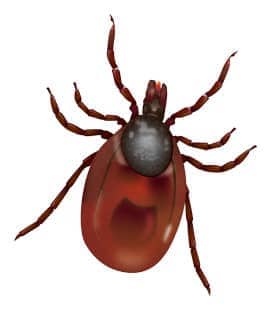What are Ticks?

Ticks are external parasites that feed on the blood of mammals. They are arachnids that have eight legs and teardrop-shaped bodies. Their coloring and size largely depend on their species, as well as their stage of development.
There are up to 15 species of ticks that live in Tennessee, but the three most commonly found species in Middle Tennessee are the brown dog tick, the lone star tick, and the American dog tick.
What are the Common Ticks Found in Tennessee?
Brown Dog Tick - Brown dog ticks can be found throughout the eastern United States and in some parts of the west, but are more likely to inhabit warm environments in the southern part of the country. They are a reddish-brown color and are approximately 1/8 of an inch in length if they haven't taken a blood meal and up to a 1/2 inch in length if they have fed. Canines are their preferred host.
Lone Star Tick - Of the three species, the lone star tick is the least likely to come into contact with people living in Tennessee. They are about 1/8 of an inch in length and brown in color. They get their name from the white spot that females have in the middle of their backs. Lone star ticks are most active from April through July.
American Dog Tick - These ticks are most active in the spring, summer, and fall. They live in parks, along wooded paths, and in farm pastures. The American dog tick prefers to use dogs, medium-sized mammals, and humans as hosts and can spread Rocky Mountain spotted fever to people. They are reddish-brown in color with white or yellow markings. Males are about 1/8 of an inch in length and females are a bit larger and can grow up to a ½ inch in length when fully engorged.
Are Ticks Dangerous?
Ticks are a danger to people and pets because they can spread a number of serious diseases. Their saliva contains germs and bacteria that can be transmitted to people through their bites. Ticks are known to spread Lyme disease, anaplasmosis, Rocky Mountain spotted fever, tularemia, ehrlichiosis, and other dangerous illnesses.
Different species of ticks spread different diseases, and not every tick is infected with a disease, but the threat is bad enough that these pests are ones to avoid at all costs. If you contract a tick-borne illness, you may experience anything from brief flu-like symptoms to a chronic illness to death.
Why Do I Have a Tick Problem?
Ticks cannot fly, jump, or move far on their own. Instead, ticks rely on hosts for transportation. Wild animals are usually responsible for bringing them onto your property. Once on your property, pets often become hosts and introduce the ticks into your home. Even if you do not have pets, you could serve as a host if you brush past them while on a walk or while working in your yard.
Ticks prefer areas with overgrowth, so they’re often found along tree lines, in overgrown grass, and in leaf piles.
How Do I Get Rid of Ticks?
At All-American Pest Control we offer pest control for ticks and fleas. In addition, our Perimeter Plus pest control for homes in Middle TN offers protection against over 47 different pests, our green pest control solutions provide eco-friendly options, and our professional pest management for businesses protects businesses that are experiencing pest problems.
Because hundreds, or even thousands, of ticks can hatch at a time, and because they are so dangerous to your health, it’s best to contact the professionals at All-American when you have a tick problem on your property. We will provide you with the services necessary to take care of your tick problem so that you can spend time outdoors with confidence.
We're Ready To Help
Call Our Office or Complete the Form To Get Your Customized Quote
Can I Get Rid of Ticks Myself?
Ticks can be difficult for homeowners to eradicate from their homes and properties on their own. Even if you believe that you have gotten rid of all the adult ticks, their eggs can still hatch months down the line, causing a re-infestation. If you have ticks invading your home or property, contact All-American Pest Control today.
Why Choose All-American Pest Control?
All-American has been at the forefront of tick control in Middle Tennessee for decades. Our trained and experienced professionals are from this area and understand the stress that comes with knowing you have a tick problem on your property. We offer the services you need to protect your family and pets from harmful ticks. You can trust our pest control experts in Nashville and Middle Tennessee to solve your tick problems.
Frequently Asked Questions
How Can I Prevent a Tick Problem in the Future?
It’s very difficult to keep wild animals from introducing ticks to your property. However, there are actions you can take to help prevent an infestation:
-
If your pets spend time outdoors, make sure they're treated with a tick prevention treatment, and check them for ticks before allowing them back into the house.
-
Ticks like to hide and wait in high grass to catch a ride on their next unsuspecting host, so keep your lawn trimmed low.
-
Remove items that attract wild animals to your property, such as bird feeders and open garbage bins.
Rake up leaf litter and other debris where ticks might hide.
-
Create a transition zone between the tree line and your lawn using crushed rock or a similar material to help minimize the spread of ticks.
If you find ticks on your lawn, pets, or yourself, contact All-American for effective tick control services.
What is the Worst Time for Ticks in Tennessee?
Unfortunately, once the weather warms up in the spring, ticks become active, and they remain that way through the fall. Adult ticks are active through spring, summer, and fall, while nymphs are typically most active in the spring and early summer. Unless the weather is too cold for ticks to move around, which is usually around 40 degrees Fahrenheit, there is the possibility of coming into contact with them.
How Do I Remove a Tick?
If you find a tick embedded in your skin, you’ll want to remove it as quickly as possible. Using a pair of tweezers, firmly grasp it as close to the skin as possible and pull it out using steady pressure. Be careful not to squeeze too hard because you don’t want the body to separate from the head. Once removed, wash the area thoroughly with soap and water and monitor it for several weeks to make sure a rash or other symptoms don’t develop. If they do, contact your doctor immediately.
How Do I Kill a Tick?
There are a variety of methods that can be used to kill a tick. Squashing a tick is not recommended, as it sometimes doesn’t work and can also cause fluids to come into contact with your skin. Submerging a tick in rubbing alcohol or bleach, freezing it, or burning it are all effective ways to kill a tick.
Helpful Articles About Ticks
Are You Struggling With Ticks in Brentwood?
How to Prevent Tick-borne Illness
 1426 Reviews
1426 Reviews




